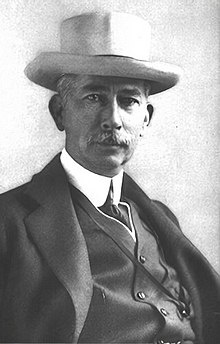Edward Mandell House
Edward Mandell House (born July 26, 1858 in Houston , Texas , † March 28, 1938 in New York City ) was an American diplomat , politician and chief foreign policy advisor to President Woodrow Wilson . He became generally known under the name Colonel House , although he only had honorary military rank.
Life
Born Edward Mandell Huis , the family name later changed to House . Edward went to Cornell University in 1877 after having been educated in schools in New England , but had to drop out early after the death of his father. After returning to Texas, he continued his father's business in cotton trading and finance.
After trying to write a novel, House became a member of the Democratic Party in politics. In Texas, he was a supporter and advisor to Governor Jim Hogg and three of his successors. In 1911 he became an advisor to New Jersey Governor Woodrow Wilson. After the election of Wilson as US President on November 5, 1912 House was his closest confidante and foreign policy advisor.
In 1932 he supported Franklin D. Roosevelt in his successful presidential candidacy .
politics
House played an important role in World War I diplomacy . From January to June 1915 he tried in vain to mediate a mutual peace between the European capitals through lively travel diplomacy. Despite the official neutrality policy of the United States, House soon propagated the slogan of the struggle of democracy against autocracy .
As Wilson's representative to the Entente , he often had differences of opinion, especially with Great Britain . With the exception of the House-Gray Memorandum of February 22, 1916, American foreign policy, externally, was noticeably neutral, although sympathies were undoubtedly with Great Britain and not with the invaders of Belgium . In the House-Gray Memorandum, which represented an ultimatum to Germany, the US undertook to intervene , probably (probably) on the Allied side, if Germany refused a peace conference, the evacuation of the occupied territories and the exchange of Alsace-Lorraine for colonial compensations. However, the memorandum had no immediate consequences.
As an associated rather than an allied power, the United States was not obliged to enter into previous allied agreements. Since they weren't directly touched, they had a different approach to the Allied war targets that were out of fashion in America . Therefore the French demand for Alsace-Lorraine did not arouse any enthusiasm there either.
House later worked with Walter Lippmann to design Wilson's 14-point program in January 1918.
At the January 18, 1919, convened by the Entente states and their allies peace conference of Versailles House was the negotiator of the US delegation. In contrast to Great Britain, the United States under House made the French at the peace conference far fewer difficulties in realizing their war goals than expected.
House also played a central role in founding the League of Nations on Wilson's behalf .
Individual evidence
- ↑ Jürgen Möckelmann: The image of Germany in the USA 1914–1918 and Wilson's war target policy. Hamburg 1964, p. 147ff.
- ^ Keith Robbins: The First World War. Oxford University Press, Oxford / New York 1984, ISBN 0-19-289149-9 , p. 114.
literature
- Charles Seymour (Ed.): The Supreme House's Confidential Documents. Stuttgart 1932.
- Godfrey Hodgson: Woodrow Wilson's Right Hand. The Life of Colonel Edward M. House. New Haven 2006, ISBN 978-0-300-09269-1 .
Web links
- Literature by and about Edward Mandell House in the catalog of the German National Library
- Newspaper article about Edward Mandell House in the 20th century press kit of the ZBW - Leibniz Information Center for Economics .
- Biography (English)
- Charles Seymour (Ed.): The Intimate Papers of Colonel House. Boston 1926-1928.
- House-Gray Memorandum in full
| personal data | |
|---|---|
| SURNAME | House, Edward Mandell |
| ALTERNATIVE NAMES | House, Colonel |
| BRIEF DESCRIPTION | American diplomat, foreign policy advisor to the President of the United States |
| DATE OF BIRTH | July 26, 1858 |
| PLACE OF BIRTH | Houston , Texas |
| DATE OF DEATH | March 28, 1938 |
| Place of death | New York City |

